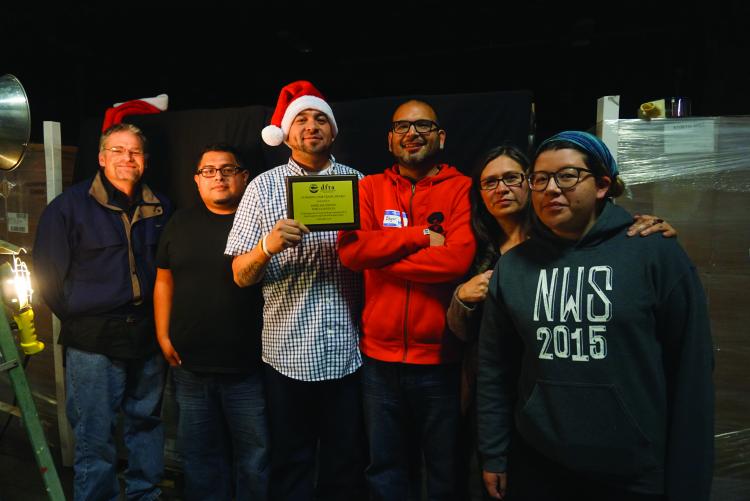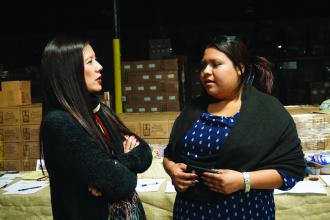The Future of Domestic Fair Trade



Communication across cities, states, and countries is easier than ever. Laptops, conference-call services, and video chatting have made it possible for international organizations such as the Domestic Fair Trade Association (DFTA) to build a strong coalition of over 30 farmworker groups, farmer organizations, retailers, manufacturers, processors, distributors, and non-government organizations in the United States and Canada. Still, no matter how hard we try, new technology can never replace the benefits of meeting face to face.
That is why every year since our founding in 2007 we have organized an in-person meeting for our members, supporters, and allies. This past year on December 9–11, we took our annual meeting to the next level and planned the National Domestic Fair Trade Conference: Racial Justice and Fair Trade in Our Agricultural System.
Our conference
The conference included opportunities to learn about issues ranging from domestic fair trade certification to ethical cannabis, as well as to hear the stories of those involved in other sectors of the agricultural supply chain.
The weekend began with a pre-conference workshop hosted by the University of Wisconsin Center for Integrated Agricultural Systems about “Decent Work” in agriculture and the global food chain. Peter Hurst, a veteran consultant to the International Labor Organization (ILO) and the Food and Agriculture Organization (FAO) presented workshop participants with a mini history lesson on global labor politics regarding agriculture and also provided us with multiple international frameworks that we can employ in our own work (http://www.ilo.org/global/topics/decent-work/lang--en/index.htm).
Although the work of the DFTA is rooted in promoting a fair and environmentally sustainable agricultural supply chain in North America, knowledge of these global frameworks helps to situate our work in an international context. Those who advocate for a highly industrialized and exploitative model of agriculture are doing so on a global scale. This workshop allowed the DFTA and our supporters to remain informed about how other countries are approaching some of the same problems that we face as advocates for fair treatment of farmworkers and small/mid-size farmers in the United States and Canada.
The day after the pre-conference workshop, instead of miring ourselves in the negative aspects of our current system, we shined a light on some of the venerable models for change that already exist. We toured Food Front Cooperative Grocery and heard from workers about their fight to unionize with United Food & Commercial Workers Local 555. Impassioned young leaders from Food Front described a struggle for fairer working conditions that ultimately led to a more-productive working relationship with management. During a group discussion over a delicious lunch provided by Food Front’s deli, the general manager of Food Front, Eamon Malloy, explained that the unionization of the co-op has helped lead to improved communication in the workplace.
Our next tour led us to PCUN, a farmworker union and Oregon’s largest Latino organization. We heard from PCUN president Ramon Ramirez, as well as the owners of Praying Mantis Farm and ANAHUAC Products who work closely with PCUN members. One conference participant noted, “The PCUN story is impressive, inspiring, and so very important.” Another mentioned that they “enjoyed a better understanding of migrant and immigrant working conditions” after the visit. Participating in these tours allows our members and other conference participants to see concrete paths toward change that they would not otherwise have the opportunity to experience.
Following these tours, we had a day of workshops and panels. To welcome our conference participants properly, Blain Snipstal, a collective farmer from Eastern Maryland, leader of La Via Campesina (https://viacampesina.org), and board member of SAAFON (http://saafon.org), gave a rousing speech on race and inequality in our food and agricultural system. More than one participant noted that one of their favorite moments of the conference was this powerful keynote.
Throughout the day, there were sessions ranging from “A Path Toward Food Sovereignty: Spotlight on Intertribal Initiatives” to “Marketing and Communicating Domestic Fair Trade Principles.” Attendees appreciated the huge variety of sessions and lauded the diversity of attendees. The day culminated with the presentation of our first annual domestic fair trade award to Familias Unidas por la Justicia, a brand new independent farmworker union based in Burlington, Wash. Their unwavering commitment to fight for justice in the fields has been inspiring to many fair-food advocates.
What’s next
Throughout the conference, DFTA members and other conference attendees were able to educate each other, network, and strategize about potential pathways forward. During our membership meeting on the last day of the conference, DFTA members discussed the organization’s strategic plan as one of the pathways toward change.
We recognized that there are two principal ways we can achieve large-scale change throughout our food system: through the market and through policy. Without a market for healthy, just, and sustainable agricultural products, it can be difficult for those companies and cooperatives that do uphold good labor and environmental practices to thrive, expand, and become the norm. Without improving labor and environmental public policy, as well as its enforcement, we are unable to ensure that workers, small and mid-size farmers, and consumers are equally protected on a large scale.
Since the DFTA has such a diverse membership, we are uniquely positioned to push change on both of these levels.
In order to drive this change, the DFTA is going to focus on two main goals for the next three years: advancing the fair trade marketplace and promoting domestic fair trade. Many of our members discussed the difficulty in dealing with multiple certifications on the ground and in communicating to consumers at the store level about all of the different certifications. To help ease these difficulties, the DFTA hopes to facilitate engagement and collaboration with certifications and our stakeholders.
One point of engagement will be to continue our work to provide expertise to certifications that renew standards or create new ones. We will also be working to connect our members to academic institutions in order to conduct research on awareness of domestic fair trade and how we can best connect conscious consumerism with real policy change.
Besides research, one new initiative to connect socially responsible purchasing with advocacy campaigns will be a domestic fair-trade promotional week. Many of our retailers find it challenging to explain domestic fair trade to consumers. We know that when people hear of the injustices that exist in the agricultural supply chain, they do not want to simply ignore it. The challenge is in disseminating that information in a way that people can broadly understand.
For the next three years, the DFTA will be working to host domestic fair-trade promotional weeks. These in-store promotions will highlight DFTA member brands and include educational events regarding the advocacy and organizing campaigns of our farmer, farmworker, and NGO members. By hosting these all-inclusive promotions, consumers will begin to more easily see the connection between vital advocacy work and support of the cooperatives and brands that are employing fair and sustainable agricultural supply chains.
Get involved
The DFTA and our members are really excited to implement our plans, but we need the help of cooperative retailers (as well as other stakeholders along the food chain). The more food co-ops involved in our organization, the more we can spread the word about domestic fair trade and build the fair and sustainable agricultural supply chain that we would all like to see become reality.
The first step to getting involved is to become a member of the DFTA. Joining the DFTA is one way that food co-ops can work to equalize the food chain. Farmworkers and small/mid-scale farmers are the most exploited in our food system, and participating in the DFTA gives these sectors a voice equal to that of other stakeholders in the supply chain.
By joining the DFTA, food co-ops are able to demonstrate that they truly believe in equality for farmworkers and small to mid-size farmers in the food chain, and thus differentiate themselves by putting their beliefs into action.
Concerning joining the DFTA as a retail member, Grace Cox, a leader of the Olympia Food Co-op and a long-time board member of the DFTA, says, “I think differentiation is one of the biggest values.”
Our agricultural system cannot be sustainable if the farmers and farmworkers who produce the product are not treated fairly. Everyone must work together to make sure this fairness is attainable.
For any questions, please email [email protected]. ♦
Photos:
DFTA members from Community to Community Development and the President of Familias Unidas por la Justicia.
Board members Joann Lo and Kathia Ramirez at the DFTA award party.
At the DFTA conference, Spencer Wood presented on ownership, racism, and poverty.







